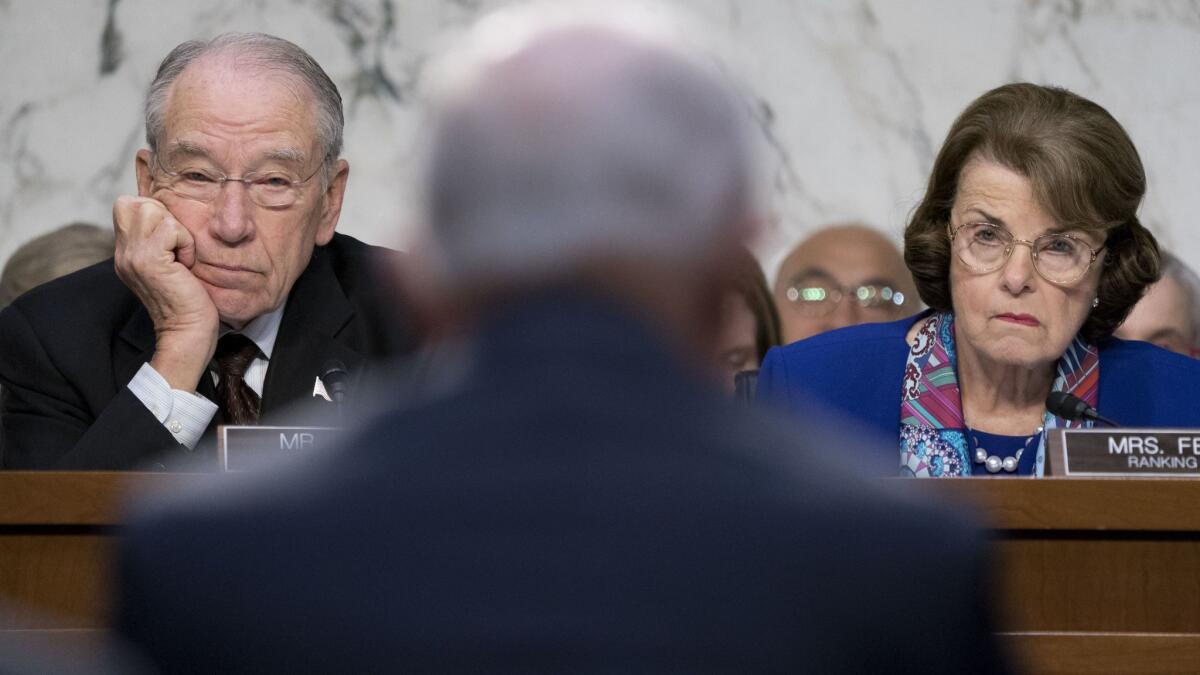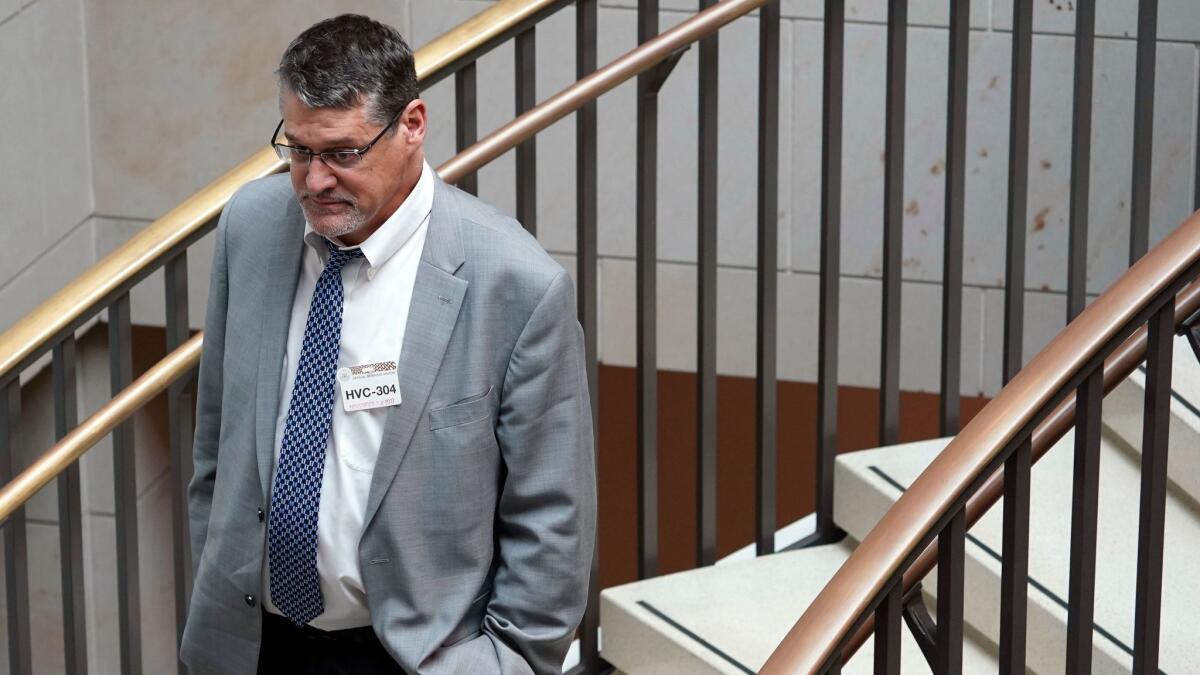Feinstein releases Senate testimony from co-founder of research firm behind notorious Trump dossier

- Share via
Reporting from Washington — In a sharp challenge to Senate Republicans, Sen. Dianne Feinstein on Tuesday released 10 hours of testimony from the co-founder of Fusion GPS, the research firm behind a notorious dossier of allegations about President Trump’s ties to officials in Russia.
Republicans on the Senate Judiciary Committee had resisted making Glenn Simpson’s lengthy testimony from August public, claiming it would interfere with multiple congressional investigations into Russian meddling in the 2016 presidential campaign.
But Feinstein, the ranking Democrat on the Judiciary Committee, released the 312-page transcript, the latest sign of a deepening partisan divide over the investigations. Simpson had urged its release, and the document contained few surprises.
“The innuendo and misinformation circulating about the transcript are part of a deeply troubling effort to undermine the investigation into potential collusion and obstruction of justice,” Feinstein, a San Francisco Democrat, said in a statement. “The only way to set the record straight is to make the transcript public.”
Republicans have argued that the tangled history of Fusion GPS’s research — it was first backed by anti-Trump Republicans and then by Democrats during the 2016 race — raised doubts about the credibility of investigations into whether any of Trump’s aides assisted Russia’s efforts to meddle in the election.
Simpson, a former Wall Street Journal reporter, described his company’s work much differently in his Aug. 22 testimony to the Judiciary Committee.
He said the research began as a general inquiry into Trump’s business background, a typical function of opposition researchers during presidential campaigns, and only later focused on questions about his relations with Russia.
Eventually, Fusion GPS hired Christopher Steele, a former British spy who had worked in Russia in the 1990s, to reach out to his sources there. They, in turn, claimed Russian officials had aided Trump for years, and had gathered compromising information on him during a 2013 visit to Moscow that they could use as blackmail.
In mid-2016, Steele told Simpson that he was so concerned about the Russian operation that he would share his research with the FBI. “It’s a national security issue,” Simpson recalled Steele saying.
Simpson said Steele was concerned “whether or not there was blackmail going on, whether a political candidate was being blackmailed.”
“He said he was professionally obligated to do it,” Simpson said. “So I just said, ‘If that’s your obligation, then you should fulfill your obligation.’ ”

Sen. Charles E. Grassley (R-Iowa), the committee chairman, criticized Feinstein’s decision to release the transcript, saying she did not consult him first.
“It’s totally confounding,” said a Grassley spokesman, Taylor Foy. “Her action undermines the integrity of the committee’s oversight work and jeopardizes its ability to secure candid voluntary testimony,” such as from Jared Kushner, Trump’s son-in-law.
The split between Feinstein and Grassley has widened in recent weeks.
Feinstein, who is running for reelection and facing a primary challenge fueled by concern from some liberals that she has not been aggressive enough in opposing Trump, has issued a flurry of news releases to announce her requests to current and former members of Trump’s campaign team for interviews and documents.
More dramatically, Grassley and Sen. Lindsey Graham (R-S.C.), another member of the committee, last week sent a classified letter urging the Justice Department to open a criminal investigation of Steele. They said Steele may have lied to investigators about his contacts with reporters.
On Tuesday, Sen. Chris Coons (D-Del.), a member of the Judiciary Committee, told reporters that Feinstein’s release of the Simpson transcript would mark “the end of bipartisan cooperation” on the panel.
Follow live coverage of the Trump administration on Essential Washington »
Simpson’s testimony provided a behind-the-scenes view of how the dossier was compiled from memos that Steele wrote after communicating with his sources in Russia.
Steele briefed an FBI agent in July 2016. Two months later, at the FBI’s request, Steele gave a more in-depth briefing to bureau officials at a meeting in Rome.
The FBI believed Steele’s “information might be credible because they had other intelligence that indicated the same thing, and one of those pieces of information was a human source inside the Trump organization,” Simpson testified.
He did not identify the source. It may have been Trump campaign aide George Papadopoulos, who told an Australian diplomat that Russia had “political dirt” on Hillary Clinton in May 2016, according to the New York Times. The diplomat later reported the conversation to the FBI.
Papadopoulos pleaded guilty in October to lying to the FBI about his conversations with Russian officials, and is cooperating with prosecutors led by special counsel Robert S. Mueller III.
Simpson said he was concerned about Trump’s “character and competence,” and his business history of dealing with people who had ties to organized crime.
One of those people, he said, was Felix Sater, a convicted felon who later became a cooperating witness with the FBI and who worked with Trump on real estate deals. He said his research didn’t turn up any sign of crimes committed by Trump.
But Simpson said he was careful not to let his personal opinions shade the conclusions of his research.
“The facts of these investigations are the facts, and we don’t try to drive an investigation to any particular conclusion, certainly not based on our political views,” he said, according to the transcript.
Twitter: @chrismegerian
ALSO
Rep. Devin Nunes plays defense for Trump by going on hard offense against Justice Department
Mueller calls back at least one participant in key meeting with Russians at Trump Tower
More to Read
Get the L.A. Times Politics newsletter
Deeply reported insights into legislation, politics and policy from Sacramento, Washington and beyond. In your inbox three times per week.
You may occasionally receive promotional content from the Los Angeles Times.













